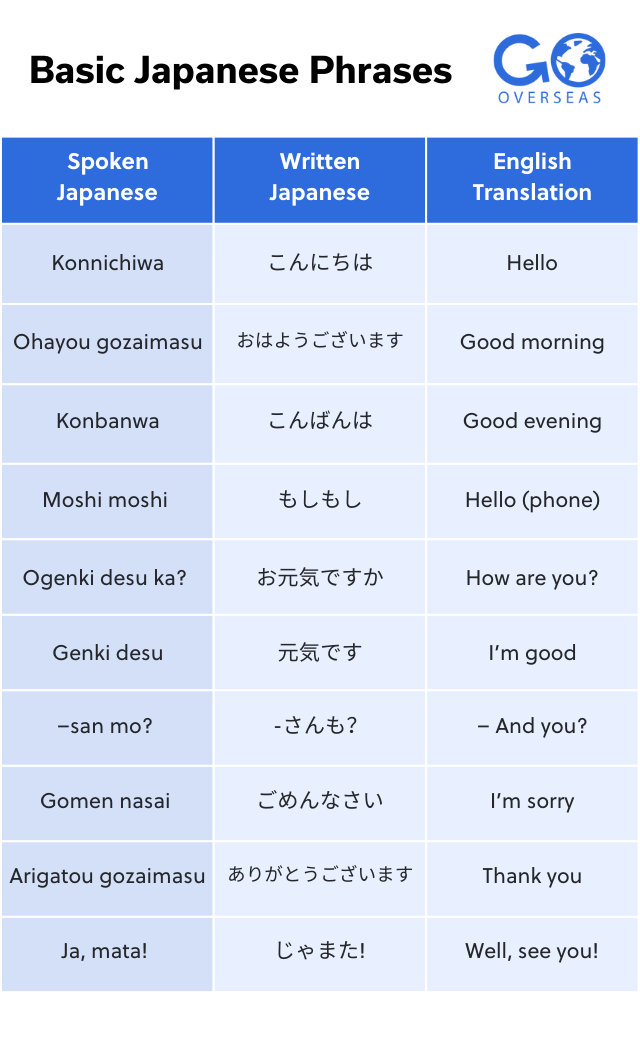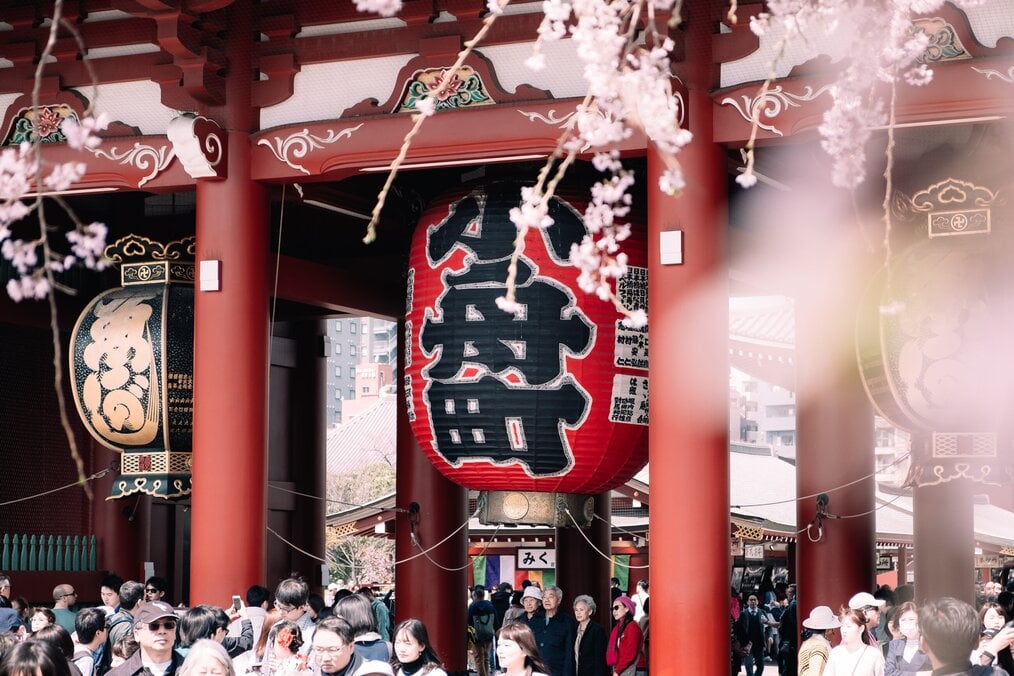
The Ultimate Guide to Learning Japanese in Japan
Learning a new language can be tough, but it doesn't have to be. Here are our top tips for learning Japanese abroad!
Key Takeaways🔑
- Start by getting to know the basics. Pick up some essential words and phrases, and get comfortable with the sounds and the three writing systems.
- Make learning fun by surrounding yourself with Japanese media and culture. Find support to help you on your language learning journey.
- The best way to learn a language is through cultural immersion. Doing a language study or homestay in Japan can accelerate your understanding, but it’s important to know what you want to get out of a language school before deciding on the right program.

If you’re interested in learning Japanese abroad, you’re in luck!
The benefits of learning Japanese are endless – whether you want to travel to Japan and enjoy the culture or simply be able to watch some anime without subtitles, learning Japanese can open up a whole new world for you!
Although Japanese is one of the most challenging languages for English speakers to learn, it's also one of the most fun! There are plenty of resources available, both online and in-person!
Plus, you don’t need to be fluent in Japanese to enjoy a lot of the culture. Learning basic phrases and greetings can help you interact with people and read signs and menus.
There are also many ways to learn Japanese, whether you choose to do so in a classroom setting with a trained instructor or on your own through self-study. Studying abroad in Japan is also an option that many consider, but regardless of which method you select, there are some effective ways you can speed up your learning process. If you’ve been on the fence about whether to dive into this slightly challenging, but beautiful language, we hope that this guide will give you the push you need.
So if you're ready to take on this exciting challenge, here are some tips and tricks on getting started learning Japanese!
Why should I learn Japanese abroad?
There are many benefits to learning Japanese abroad, but one of the most important is making you more comfortable speaking and listening to the language. Studying in your home country, you'll get plenty of practice reading and writing in a classroom setting but only limited experience speaking with native speakers. Learning Japanese abroad allows you to immerse yourself in the language and emulate native speakers. This can be especially helpful if your goal is not just to learn conversational Japanese but to be able to speak like a native.
Cultural immersion
Another good reason for learning Japanese abroad is that it helps you learn about Japanese culture firsthand. You can explore cultural sites with your local peers or ask them questions about their daily life for growing up. This type of insight into Japanese culture is difficult to find in a textbook or lecture hall, so be sure to take advantage of all the opportunities available when studying abroad!
Living at home can make it challenging to learn a new language. After all, it’s hard to unleash your inner linguist while surrounded by your native language. Furthermore, you have only so many opportunities to practice speaking with native speakers when you don’t live in a Japanese-speaking country. It helps to get away from your everyday routine and immerse yourself in the language you want to learn.
Read more: Should You Learn a Language in the Classroom or Through Immersion?
Homestay benefits
There are many options for learning Japanese abroad, but one of the most popular is homestays. Living with a host family offers excellent benefits like improving your language skills and gaining cultural understanding. In addition, you’ll have the opportunity to converse with native speakers daily and enjoy activities like cooking traditional meals together and watching TV together (or just hanging out). It’s also nice to have someone who knows the local area well and can offer suggestions for things to do nearby or arrange day trips!
Quick tip: When trying to make friends, start with small talk: ask a question about their job or hobbies and then compliment them on their choice of kawaii (cute) socks!
Check out Sharla’s vlog of her unique homestay experience in Northern Japan!
What to know before learning Japanese abroad

Learning Japanese abroad is rewarding to experience the language and culture like a local. But before you start learning, you should know a few things.
The Japanese writing system has three scripts, hiragana, katakana, and kanji. Kanji is the most complex of these three scripts because it consists of thousands of characters borrowed from Chinese. Hiragana and katakana are two phonetically based syllabaries used to write native Japanese words (hiragana) or foreign words (katakana).
Start with pronunciation — pitch accents, long & short vowel sounds, double consonants, and dropping sounds. An excellent way to learn these is by watching an anime or reading manga in Japanese alongside translations in your native language. The more you read over time, the easier it will become for you to understand what's being said without the help of those translations. Another great way to learn is using language learning apps like Duolingo, which breaks up the three different scripts while teaching basic phrases. Of course, it's always better to know some basic phrases before going somewhere new!

Read more: What to Know Before Studying Abroad in Japan
Beginner tips for learning Japanese

Buy a Japanese language workbook
Buy a workbook or two to practice on your own time—even when you don’t have access to an Internet connection. Japanese has very strict sentence structures. So it might seem like a lot to memorize at first. But don’t let that intimidate you! Learning the basic structures and patterns of the language will set you up for success down the road.
Immerse yourself in Japanese media
The best way to learn a language is by immersing yourself in it, meaning speaking Japanese every day. If you’re not living in Japan, you can surround yourself with Japanese media. There are plenty of ways to study Japanese from home. Listening to Japanese podcasts and reading Japanese manga can help introduce you to the basic sounds and words of the language.
Watch Japanese TV with English subtitles
Japanese TV shows are a great way to familiarize yourself with language patterns and sentence structures that you don’t often find in formal lessons. I highly recommend checking out Netflix, Hulu, or Crunchyroll so you can stream episodes whenever you want. This also gives you the option of storing them on your phone, so you can watch TV shows wherever you go.
Listen & sing to Japanese music
Everyone knows what it’s like to be stuck on a catchy song! And one of the best ways you can use this knowledge is by listening and singing along to Japanese music. Of course, this will help you learn new vocabulary, but it will also help improve your pronunciation skills and give your brain a musical workout!
Read manga or children’s books
Manga and children's books in Japanese are excellent resources for learning new words and phrases. Manga and children's books are fun to read, and they're also very informative. The beautiful illustrations help your brain absorb the information it needs more easily. Manga is available in every major language, so it's a great way to get exposure to the language while enjoying some great entertainment.
Listen to language podcasts
Japanese podcasts are another great resource for learning to speak Japanese. There are plenty of free ones available online from different sources. Some require paid subscriptions with additional features and benefits. Some of our favorites include:
Embrace Japan's counter-culture and learn to love slang!
While it might not be the most appropriate vocabulary for your business meeting or a formal dinner party, it will help you understand the untranslatable phrases many anime characters and YouTube stars use.
You’ll find yourself laughing out loud at common slang words like やばい (yabai), which translated means terrible. Like English words bad and wicked – younger generations also use the phrase to express something really cool, but depending on the context can also be used to express someone who’s inconvenienced.
Where to learn Japanese abroad

Spend a few weeks or months in the country, and you could come away with a better grasp of the language and a deeper understanding of Japan’s culture and history. You’ll also get to see some stunning scenery along the way — from snowy mountains to cherry blossom-lined waterways.
Tokyo
Japan’s capital is one of the world’s most popular destinations for language learners. Tokyo is famous partly due to its convenient location, but it’s also because the city has so much going for it. There's something here for everyone with its famous shopping districts, weird and beautiful neighborhoods, and theme parks galore. Many excellent language schools offer programs learning in Tokyo, including KCP International and Meiji Academy
Kyoto
This historic city was once the imperial capital of Japan, so if you want to get an education in Japanese history, this is where you should go. Try to learn in Kyoto during cherry blossom season to see these beautiful flowers as you study. There are six different UNESCO World Heritage Sites here — including Kinkaku-Ji (the Golden Pavilion) and Nijo Castle.
Osaka
Osaka is Japan's food capital and boasts several attractions popular with international students, such as Universal Studios Japan and the Osaka Aquarium Kaiyukan. The city also has an active nightlife scene for those who want to delve into Japan's pop culture. You can study at the renowned Kansai-Gaidai University or the Osaka University of Foreign Studies.
Sapporo
Sapporo is known for its snow festivals, but it offers more than just winter sports — with world-class onsen (hot springs) and some beautiful national parks within easy reach. It’s also the home of the Sapporo beer brewery, the oldest brand of beer in Japan. Sapporo has some top-notch Japanese language schools, too. For example, you could attend an intensive language summer course with Hokkaido University or JaLS Group. You can also participate in an international exchange program at Hokusei Gakuen University.
Hiroshima
A few decades after the bombing, Hiroshima became one of Japan’s most prosperous cities thanks to its position as an industrial hub and its proximity to nearby islands that boast beautiful beaches and coral reefs. It’s also home to several universities and has a young, hip vibe that creates a fun atmosphere for students.
How to pick a Japanese language school program

The first step in choosing a Japanese language school in Japan is figuring out what you want to get out of it. If you're an absolute beginner, you'll want to look for schools that offer classes designed specifically for beginners. On the other hand, if you don't feel confident in your skills or haven't studied Japanese in years: look for a program that will meet your level and help address your specific needs.
Location
The city you pick will have a significant impact on your experience. You'll want to research the region's weather and make sure it's somewhere you're comfortable living for an extended period of time. Many programs are located in or near large cities where there is plenty to do and see.
Length of stay
Programs can vary from as little as one week to over one year. Consider how long you're willing to be away from home and what amount of time realistically works with your schedule.
Teachers and curriculum
Quality teachers and a relevant curriculum are paramount in your learning process! Check out our program alumni reviews, speak with people who have previously attended the same program, or even find someone currently enrolled in the program to learn more about these aspects!
Facilities and accommodation options
Your learning environment can play into how much you enjoy being abroad. If you're hoping for breathtaking views or lots of natural light, those factors should be considered when picking a location and school facility. Additionally, suppose sharing rooms isn't your thing. Different accommodation options may be available through the school itself, or nearby hostels and hotels may suit your needs better (in this case, they must be close by so traveling doesn't take up too much of your day).
Cost, scholarships, and budgeting tips
As with any big decision in life, money will inevitably play some role in choosing which program is best for you – but don't let it stop you from pursuing something worthwhile! There are many scholarships and grants available; doing a little research could lead to finding funds that would help make studying abroad possible for anyone interested!
Can’t go abroad? Consider enrolling in a virtual Japanese language course

If you can't leave your home country but still want to learn Japanese, don't worry—you can still enroll in an online class with a Japanese-speaking teacher.
Online classes are an excellent choice for people who want the flexibility of learning on their schedule and those who want to learn from anywhere (even during their commute). They're also generally cheaper than in-person courses, making them ideal for people with limited funds or time commitments outside of work.
Keep in mind that online classes give you more flexibility and control over your schedule than in-person courses do—but this also means that taking an online course requires more self-discipline and motivation on your part!
Get a Japanese language Tutor
Find a tutor who speaks Japanese fluently (preferably one who has studied Japanese linguistics). You can also take classes at a local community college or online through Preply, Italki, and Verbalplanet. Speaking with someone helps get feedback on your pronunciation and learn how words work together.
Remember that a tutor can only help give context to the sentence structure and help perfect your pronunciation. Learning vocabulary words is done primarily outside of the classroom.
Find a language partner who speaks Japanese
Make friends with native speakers. A language exchange (or tandem learning) is where two people from different mother tongues meet up so they can teach each other their respective languages. Finding a language partner is a great way to learn new vocabulary and have someone correct your mistakes as you go along. If no one speaks Japanese near where you live, try Skype or social media websites like HelloTalk, where you can connect with native speakers worldwide. (HelloTalk also has a built-in chat system and translator!)
Join a group
If you can't take time off to travel abroad to study in Japan, you can still improve your language skills by joining a language exchange group. One of the most effective methods is to set up a study group with other people trying to learn the language. This will allow you to share your skills and knowledge while learning from each other. It's also an opportunity for making new friends!
Forum websites like Word References, Stack Exchange, Japan Reference, and Reddit Learn Japanese cater specifically to those who want to learn Japanese but don't have access to an instructor or class. These language learning groups can also be found on popular social networks like Facebook.
Ready to learn Japanese abroad?

When it comes to learning another language, it’s essential to have a firm idea of what you want, as defining your goals and expectations ahead of time will motivate you in the long run.
Though the process can be challenging at times, and it's normal for some people to get discouraged, learning a new language abroad can open many doors. Immersing yourself in another culture is a fantastic experience that offers countless benefits.
If you take the time to learn the basics and study regularly, you'll improve over time, or at the very least, you’ll be able to ask for directions while in Japan!
Good luck!






